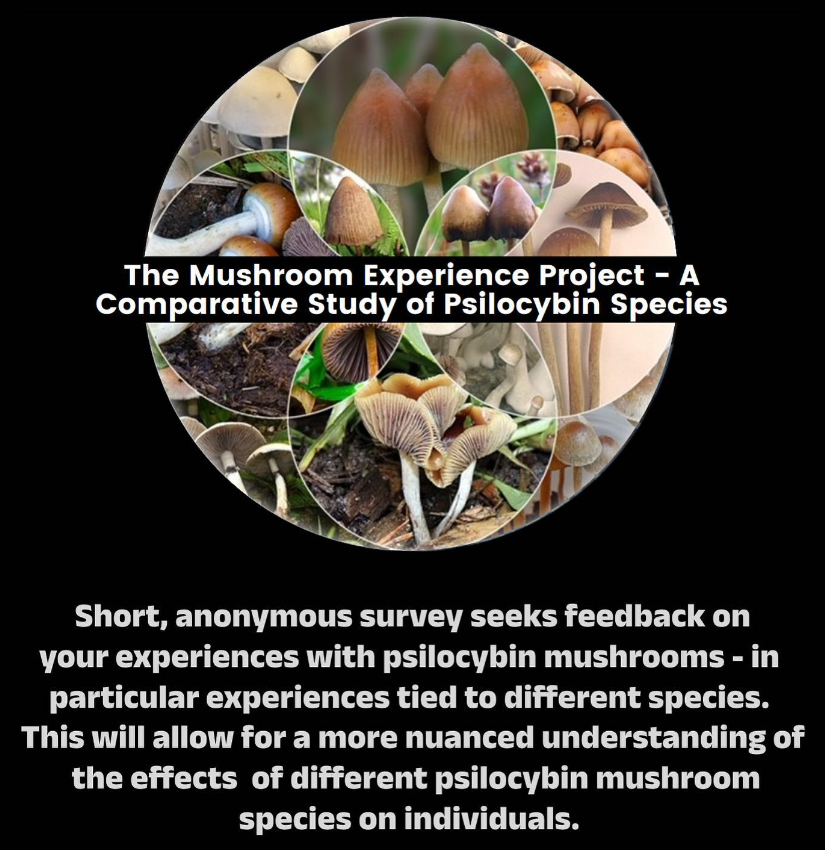Attention all mushroom munching psilonauts…this survey study is focused on systematically investigating the subjective effects attributed to different psilocybin mushroom species. The ‘Mushroom Experience Project’ is a completely anonymous survey and should only take a few minutes of your time. Our goal is to enhance the scientific understanding of these experiences and their potential variations across species, with a focus on commonly-used, psilocybin-containing mushrooms.

The Need for Knowledge
In recent years, psilocybin mushrooms have garnered growing attention for their potential therapeutic benefits to mental health. The currently prevailing scientific view states that the effects of these mushrooms are primarily influenced by dosage and set and setting factors, rather than anything intrinsic to a given mushroom. However, what might be considered a majority consensus from experienced growers and psilonauts is that different species of psilocybin mushroom do consistently vary in their effects.
A growing body of research is also beginning to challenge the notion that all psilocybin-containing fungi are homogenous in their psychoactive properties, with a growing body of evidence highlighting “that our understanding of the chemical diversity of these mushrooms is largely incomplete,” as stated by one investigator.
While the jury is still out on the possible modulating influence of other secondary compounds in these fungi, it is worth considering that we’ve barely scratched the surface of chemically profiling them. There is a growing body of research suggesting that there may be more than psilocybin alone underlying the effect of these fungi, with findings suggesting other compounds present in the fungi may have a modulating effect on the psilocybin experience. We should be mindful that these fungi are not merely packets of pure psilocybin, but chemically complex organisms.
Calling All Psilonauts
In light of this, it may be a little hasty to dismiss testimonials attributing differences in perceived effects attributed to the various psilocybin mushroom species, while leaning completely on the clearly incomplete analytical chemistry evidence. Exploring the perceived effects attributed to different species of these fungi makes for an interesting topic of research given the wide gulf between the prevailing mainstream scientific view and the views expressed by many who have sampled various mushroom species.
With this in mind, a collaborator and I were motivated to launch ‘The Mushroom Experience Project’ to try and find out more about the effects attributed to different psilocybin mushroom species, and by doing so, hopefully shift this conversation from the realm of the purely anecdotal.
Our goal with this research study is to enhance the scientific understanding of these experiences and their potential variations across species, with a focus on commonly used, psilocybin-containing mushrooms. This is a boom or bust, go big or go home type scenario when it comes to netting sufficient data. If we don’t make up a sufficient sample size, it will all be for nothing, so all and any feedback and any sharing of the survey is very much appreciated.

Research Objectives
This study seeks to identify patterns and distinctions in the subjective experiences elicited by various psilocybin mushroom species, addressing questions such as:
Do different species cause different subjective effects?
Do certain effects always co-occur?
Are there a set of clusters into which we can group species depending on their effects?
And many more! Your input as an experienced user is critical in enabling us to discern these patterns, contributing to a more nuanced understanding in the field of fungal psychopharmacology. This is especially the case for those of you experienced with species that are less frequently used.

Your Participation
You will be presented with a list of psychoactive mushroom species/varieties and asked to select those species that you have used at least once in the past 12 months. For each of those species, we will then ask specific questions to capture the qualitative aspects of your typical experience with this species.
This includes sensory perceptions, cognitive changes, and emotional responses you associate with each species. Participation is completely anonymous.
Are there any risks? What happens to the information I provide?
We do not expect that your participation in the study will expose you to more psychological distress than you experience in your daily life. You will not be asked for information that would identify you beyond reasonable doubt.
Demographic information assessed will be minimal, and you are free to skip these questions. To ensure full anonymity, no further identifying information (e.g., IP-addresses, operating system, browser info) will be saved by Qualtrics.
If you change your mind about participating in the study, you are free to leave the study at any time (by closing the browser window) without providing any reason.
Your responses may be used by the research team for data analysis, shared with other researchers, or made available to other researchers in an online data repository.
Please note that once you have fully completed participation in the study, your data cannot be identified and therefore cannot be withdrawn. If you have serious concerns about the ethical conduct of this study, please inform the University of Zurich Ethics Committee in writing, detailing your concerns.
Link to survey is below…all and any feedback and sharing of the survey is much appreciated 🙂
















